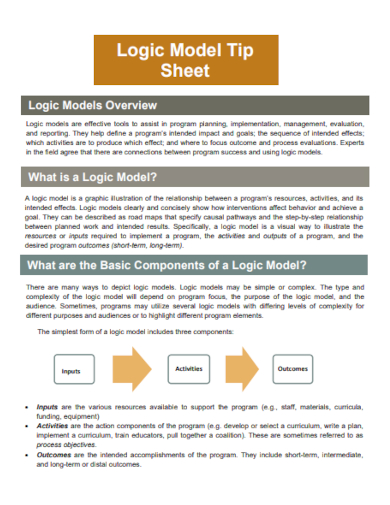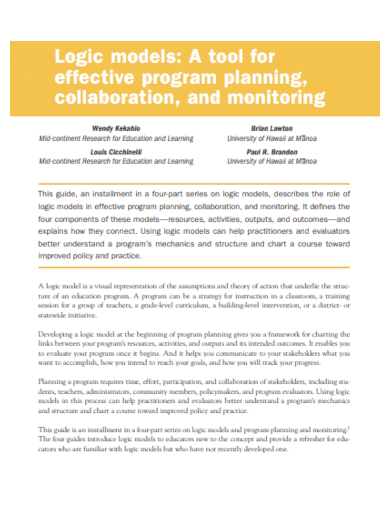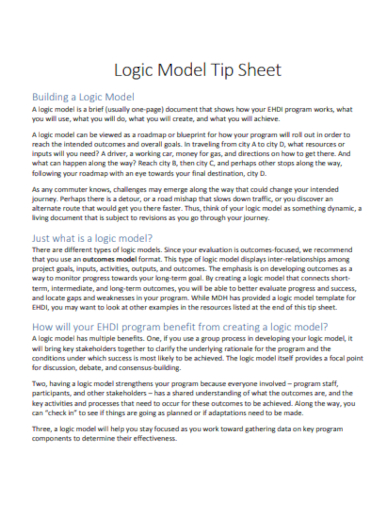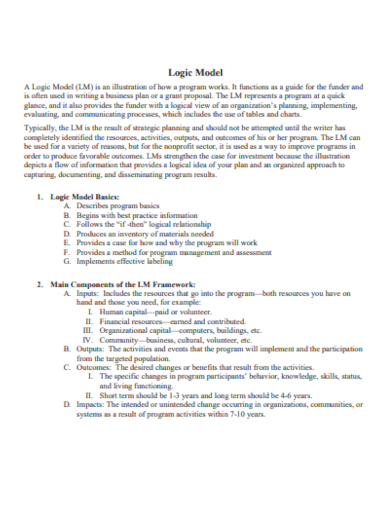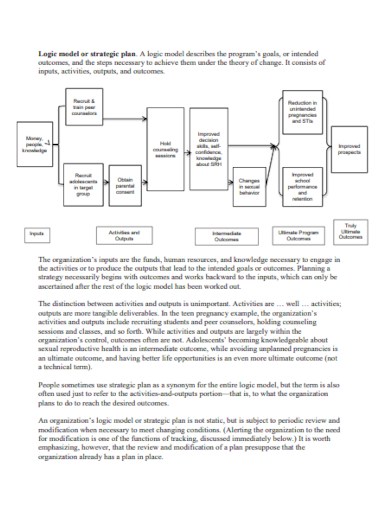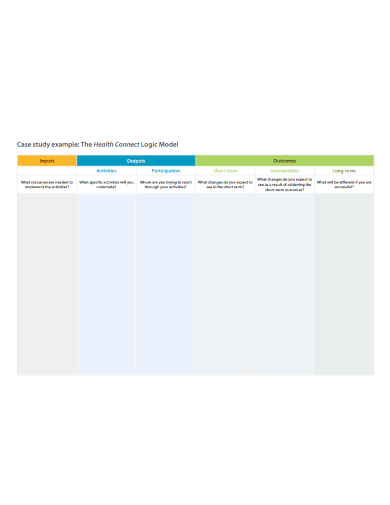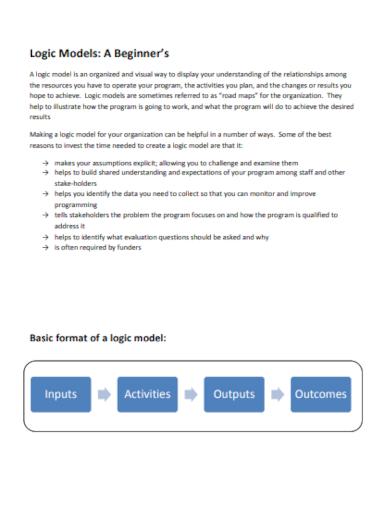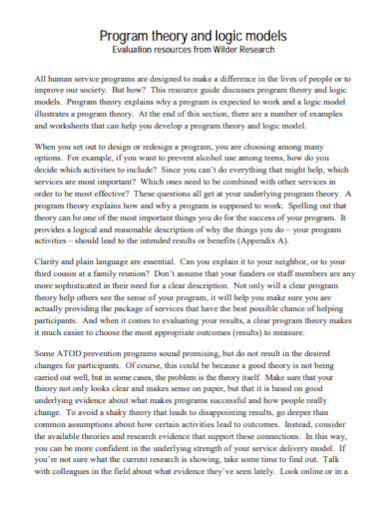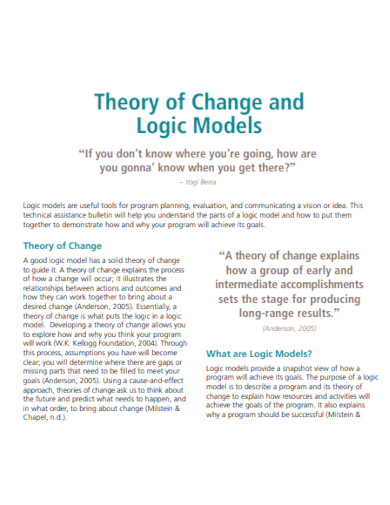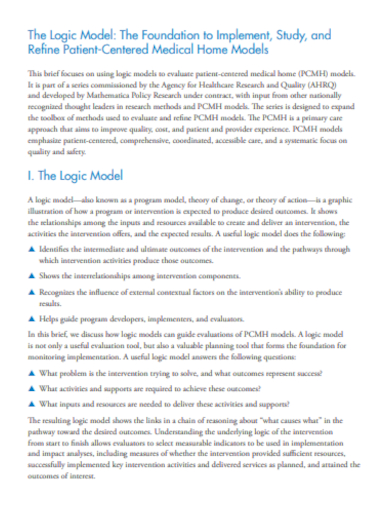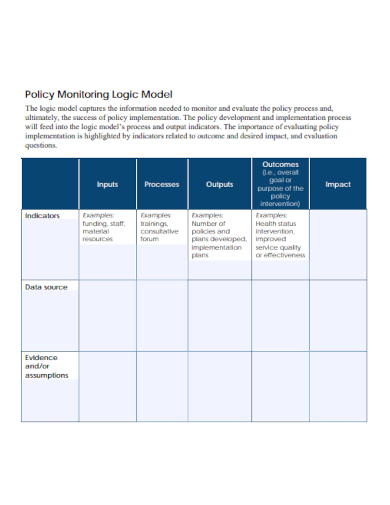In creating programs, projects, initiatives, or partnerships, developers determine first where they are going with their project, the methods they’ll use, and what will decide if they have arrived at a conclusion. When identifying which is needed to be evaluated in an existing program or when developing a new one, a logic model is an effective tool for presenting the different components, activities, and objectives of a program.
10+ Logic Model Samples
1. Logic Model Tip Sheet
2. Logic Model Program Planning
3. Building Logic Model Tip Sheet
4. Framework Logic Model
5. Logic Model Strategic Plan
6. Case Study Logic Model
7. Basic Format of Logic Model
8. Program Theory Logic Model
9. Theory of Change Logic Model
10. Medical Logic Model
11. Policy Monitoring Logic Model
What is a Logic Model Template?
A logic model template is a document that displays a graphic representation of relationships among the inputs, outputs, and outcomes of a program and is used as a program roadmap or project planning tool that explains the reason behind the design of a program and presents the specific ways on how the activities of the program arrive at the desired outcome. This can also be used to confirm that an existing program is still operating on its desired function in the current environment.
How to Use a Logic Model Template?
Identifying first the inputs, outputs, and outcomes in the early stages of program planning enables the process of activities to its results to proceed according to your intended flow. With their visual representations, logic models can help you create action plans for the program’s activities and enable the program implementers to view how individual pieces match a larger program objective. A logic model template also helps in tracking the activities of your program as well as their achievements and issues.
Step 1: Determine the Problem you want to address
Determine the problem addressed by the program so all individuals involved in developing the program can have the same description of the issue. This also ensures that all developers are informed about the program’s goals before starting with their tasks and activities.
Step 2: Identify the Main Program Inputs
Consider key areas like human resources, office supplies, and field resources when determining the resources you need for your programs. You can also create a list of items that are can help in developing your program.
Step 3: Determine the Outputs
To make sure that your program’s activities, services, products, and events are successful, you have to determine the action programs the developers should take which should be based on the program’s characteristics and should aim for customer service and engagement.
Step 4: Determine the Program Outcomes
Determine the outcome of your program by splitting it into short-term, mid-term, and long-term goals. This will allow you to easily identify and monitor your program as time progresses. To track the advancements of your outcomes, be sure to determine a starting point or a baseline for the factors or areas where improvements are needed.
FAQs
What are the external influencing factors in programming?
Program developments are influenced by external factors such as the environment or its setting, other programs that operate in the same program area, and influences that refer to a person within a community or region that can help in conveying the message that the program wants to relay.
What are the reasons for developing a logic model?
A logic plan is a part of an evaluation plan that a funder or grantor needs in their business proposal or project proposal. It also provides a visual representation of measurable goals and objectives which are usually requested by program stakeholders and provides insights into how a program functions and what its purposes are.
What are the advantages of using a logic model?
With a logic model, programs can be clearly communicated to people outside the program, provides a common understanding of how the program functions, allows you to choose a small set of performance indicators and shows related activities and outputs of the program.
Logic model templates are printable templates that are used when designing a new program or when confirming the design of an existing program to ensure that they function as desired under their current conditions. It is also used as a visual tool that outlines the intended activities and the desired results of a program as well as clarifies its goals and objectives. A logic model can be used as a part of strategic planning in coming up with action plans to prevent further occurances of issues.
Related Posts
FREE 10+ Strategic Staffing Plan Samples
FREE 9+ Sample CDC Growth Chart
FREE 8+ Sample Blank Spreadsheet
FREE How to Make Strategic Planning Implementation Work?
FREE 8+ Sample Figure of Speech
FREE 8+ Microsoft MS Word Samples
FREE 5+ Sample Marathon Pace Chart
FREE 10+ Business Model Report Samples
FREE 10+ Strategy Map Samples
FREE 10+ Execution Strategy Samples
FREE 10+ Preventive Action Plan Samples
FREE 8+ Blank Spreadsheet Samples
FREE 6+ Sample Education Power Point
FREE 4+ Strategy Execution Plan Samples
FREE 3+ Grant Proposal Cover Letter Samples

